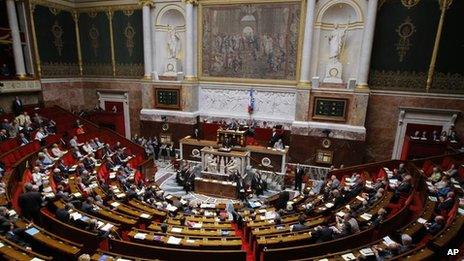Q&A: Elections to the French National Assembly
- Published

There is still debate as to who will benefit most from the complex voting system
Elections to the French National Assembly will take place in two rounds on 10 and 17 June. All eyes are on whether President Francois Hollande - elected just last month - will obtain majority support in France's lower house.
What is at stake?
Francois Hollande needs his Socialists and their allies to wrest control of the National Assembly from the right so that he can implement his policies. The upper house, the Senate, is already dominated by left-wing parties.
If the left fails to win, France would enter into a period of "cohabitation", in which the presidency and the lower house are controlled by political rivals.
The far-right National Front is hoping to follow up a strong performance in the presidential election by gaining its first seats in the National Assembly since the 1980s.
Why are there two rounds?
In any constituency, a candidate who wins an absolute majority of votes cast and the votes of at least a quarter of registered voters is elected to the 577-strong National Assembly.
Failing that, a runoff is held between all candidates who obtained at least 12.5% of the votes of registered voters in that constituency. Whoever wins the biggest share of the vote in the runoff is elected.
The final distribution of seats thus depends a lot on local alliances and the way in which the vote is split between different candidates. Smaller parties may find it difficult to win any seats at all.
For example, in 2002 the far-right National Front obtained 11% of the vote in the first round but failed to win any seats, while the Communist Party won 21 seats on a first-round score of 5%.
ć¶Ä
Who are the main players?
On the left, Francois Hollande's Socialist Party has concluded electoral pacts with the smaller Europe Ecology, The Greens and the Radical Left Party. Another potential coalition partner is the more radical Left Front, which brings together the Communist Party and the Left Party and has fielded candidates in nearly all constituencies.
On the right, the Union for a Popular Movement (the UMP - the party of former President Nicolas Sarkozy) is defending an absolute majority in the current National Assembly. The party has concluded an electoral agreement with its centrist Radical Party and New Centre allies.
The far-right National Front has ruled out any pact with the UMP.
Other parties to field candidates include the far-left Workers' Struggle and New Anti-Capitalist Party as well as the Centre for France.
ć¶Ä
What are the polls saying?
The most recent opinion polls put the Socialist Party and its allies at some 36% while the UMP and its allies are credited with about 32% in the first round.
The National Front can expect 15% of the vote, the Left Front 9% and the Centre for France 4%, according to those polls.
Such an outcome could mean that the Socialists would have to include the Left Front in a broad left-leaning coalition to achieve an absolute majority in the lower house.
ć¶Ä
How is the election portrayed in the media?
The polls are viewed as a test of the endurance of the Socialists' political vision among the electorate after a presidential contest which was dominated by personalities. Much was made of Mr Hollande's anti-austerity stance during the presidential election - but the extent to which the result was shaped by personal animosity towards Mr Sarkozy is unclear.
The fortunes of the UMP are also the subject of much debate. Wounded by Mr Sarkozy's defeat, the party has failed to portray a united front as it struggles to appoint a successor. A report by the France 24 news channel has suggested that continued disharmony could result in an "election shipwreck".
There is also discussion of the rise in popularity of the National Front, and the possibility that the party may take votes from the UMP and secure its first seats in decades.
<link> <caption>“óĻó“«Ć½ Monitoring</caption> <url href="http://www.monitor.bbc.co.uk/" platform="highweb"/> </link> <italic> selects and translates news from radio, television, press, news agencies and the internet from 150 countries in more than 70 languages. It is based in Caversham, UK, and has several bureaux abroad. For more reports from “óĻó“«Ć½ Monitoring, </italic> <link> <caption>click here</caption> <url href="http://www.bbc.co.uk/news/world-18190302" platform="highweb"/> </link>
- Published3 June 2012
- Published24 April 2012